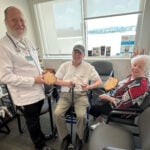She looked relatively healthy. Middle-aged, calm, composed. She had tried everything—until she hadn’t. That’s how she found herself on the OR schedule for a hysterectomy.
Years of irregular, heavy bleeding had led her here. She didn’t want surgery, but she was tired. Tired of bleeding, tired of not being heard, tired of grasping for answers. This was the final option, or so it seemed.
But then, just before the surgery, a resident reviewing her chart paused. Something didn’t add up. The bleeding pattern, her history—it didn’t quite fit the typical mold. So, he asked her, “Have you ever been diagnosed with PCOS?”
She paused. “Yeah… back when I was a teenager. But I didn’t think it mattered now.”
And just like that, the entire picture shifted.
Polycystic ovary syndrome, or PCOS, is a condition we as physicians are taught to associate with irregular cycles, metabolic issues, hormonal imbalance. It can wreak havoc on a woman’s reproductive health, but it’s manageable. Sometimes it just needs to be named—and reframed—to be treated properly.
And that was the tragedy of this case. PCOS explained everything. With proper management—perhaps weight loss, metformin, hormonal therapy—her bleeding may have stopped. She might never have needed to go under the knife.
But she did. The surgery wasn’t canceled. We were too far along. No one wanted to step on anyone’s toes. The patient herself, though weary, gave consent. Maybe she, too, just didn’t have the energy anymore to reverse course.
I’ve been thinking a lot about that moment. About how close we came to a better outcome. About the subtle culture in medicine that sometimes favors inertia over interruption. That frowns upon questioning decisions once they’ve gained momentum. And about how many patients silently carry old diagnoses they no longer mention—either because they don’t see the relevance or because they’ve never been taught its full significance.
We could debate whether the surgery should have been canceled. But the deeper issue is this: Our systems don’t always allow space for late realizations. In an ideal world, medicine is fluid, dynamic, always adjusting course. But in reality, it’s often bureaucratic, hierarchical, and exhausting—for both patients and providers.
We must do better at building a culture that values curiosity over compliance. A culture where a resident asking one extra question is celebrated—not dismissed. Where patients are educated enough about their own diagnoses to speak confidently about them. And where the instinct to pause and reevaluate—even moments before a major surgery—is seen not as disruptive, but as deeply caring.
Because sometimes, the right diagnosis comes late. But when it does, we should have the courage to let it change everything.
Zain Abidin is a medical student.


















![Sabbaticals provide a critical lifeline for sustainable medical careers [PODCAST]](https://kevinmd.com/wp-content/uploads/The-Podcast-by-KevinMD-WideScreen-3000-px-3-190x100.jpg)
![Teaching joy transforms the future of medical practice [PODCAST]](https://kevinmd.com/wp-content/uploads/Design-1-1-190x100.jpg)
